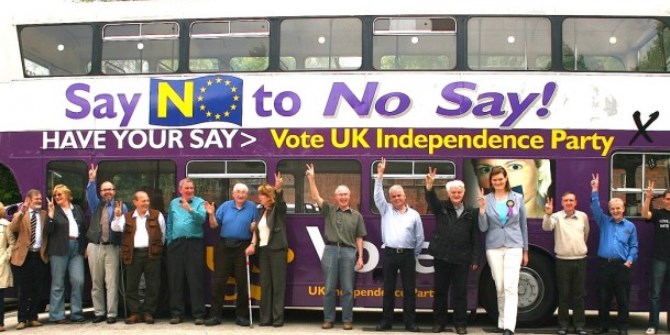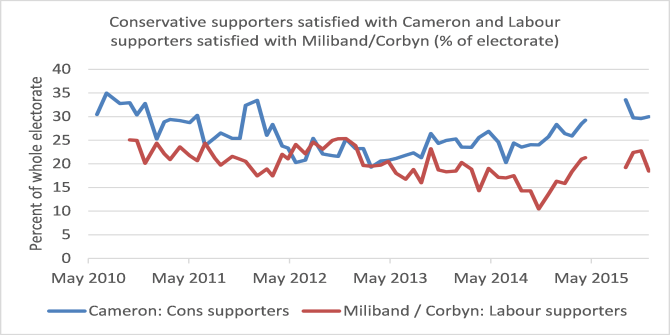
 How does the general public regard faith-based schools? Are they seen as one of the ways by which individual parents are able to exercise freedom of choice? Analysis by Stratos Patrikios and John Curtice of attitudes to school choice and faith-based schools in all four parts of the UK strongly suggests that people’s attitudes towards faith-based schools have in fact relatively little to do with their views about giving individual parents the ability to choose. Instead, people’s opinions about such schools are primarily a reflection of their (collective) religious identity.
How does the general public regard faith-based schools? Are they seen as one of the ways by which individual parents are able to exercise freedom of choice? Analysis by Stratos Patrikios and John Curtice of attitudes to school choice and faith-based schools in all four parts of the UK strongly suggests that people’s attitudes towards faith-based schools have in fact relatively little to do with their views about giving individual parents the ability to choose. Instead, people’s opinions about such schools are primarily a reflection of their (collective) religious identity.
Diversity of provision has become one of the key features of public service reform, including not least in education in England. The last Labour government introduced City Academies run by private sector and charitable organisations, while the current Conservative/Liberal Democrat coalition has made it possible for parents themselves to establish so-called ‘free’ schools. Thanks to this greater diversity parents are, much like consumers in the marketplace, able to exercise choice as to which (and what kind of) school their child attends.
But, in truth, there has long been diversity of educational provision throughout the UK – in the form of faith-based schools that are run (and in some cases partly funded) by religious organisations. In England and Wales there are both Anglican schools and Catholic ones operating alongside schools that have no formal denominational affiliation at all, although in Scotland and Northern Ireland nearly all faith-based schools are associated with the Catholic Church. Consequently parents are able to choose whether to send their child to a school that reflects a particular religious ethos or not.
Advocates of public service reform, including not least the former Prime Minister, Tony Blair, often regard faith-based schools as prime examples of the diversity of provision and thus opportunity to choose, which they seek to promote. But is this how the general public regard faith-based schools? Are they seen as one of the ways by which individual parents are able to exercise freedom of choice? Or are they more commonly regarded as a way of promoting the collective interests and beliefs of a particular social group? After all, the Catholic Church in particular has long regarded faith-based schools as an important way of ensuring continuing adherence to what in the UK is a minority faith.
Our recently published analysis of attitudes to school choice and faith-based schools in all four parts of the UK strongly suggests that people’s attitudes towards faith-based schools have in fact relatively little to do with their views about giving individual parents the ability to choose. Instead, people’s opinions about such schools are primarily a reflection of their (collective) religious identity.
The principle of school choice is popular, even in those parts of the UK (that is everywhere outside of England) where greater diversity of provision has not recently been promoted. Between 76 per cent (in Scotland) and 84 per cent (in Northern Ireland) agree that parents of a secondary school child should have ‘a great deal’ or ‘quite a lot of choice about which state school their child goes to’. Moreover, this mood is reflected in attitudes to one of the forms of diversity of provision introduced in England, namely schools that develop a ‘specialist’ expertise in a particular subject such as maths or music. Such schools are backed by between 50 per cent (in Northern Ireland) and 60 per cent (in England) across the four territories of the UK.
Attitudes to faith-based schools, in contrast, are very different. Only between 24 per cent (in Scotland) and 36 per cent (in Wales) support ‘having some schools that are linked to a particular religious denomination, such as Roman Catholic’. Moreover, only a minority of those who endorse the principle of school choice go on to express support for faith-based schools.
The one group amongst whom there is majority support for faith-based schools throughout the UK are those who self-identify as Catholic. Backing for such schools amongst Catholics stands at between 54 per cent (in Northern Ireland) and 68 per cent (in Scotland). Evidently support for such schools depends much more on religious identity than it does on attitudes towards freedom of choice.
Of course, not all faith-based schools are Catholic. As we have already noted, in England and Wales many such schools are linked with the Anglican Church. So, if attitudes towards faith-based schools are a reflection of people’s sense of identity, and their perceptions of whose collective interests such schools are thought to serve, we might anticipate that Protestants living in England and Wales would be more supportive than those in Scotland or Northern Ireland. This does indeed prove to be the case. In Wales 41 per cent of Protestants support faith-based schools, as do 33 per cent of those living in England. In contrast, support stands at just 16 per cent in Scotland and 17 per cent in Northern Ireland.
None of this, of course, necessarily means that faith-based schools should not continue to be provided in the UK, although the level of popular support for such provision is apparently not as high as the advocates of faith-based schools would like. What our analysis does suggest, however, is that it is a mistake to assume that public support for freedom of choice necessarily translates into backing for all forms of diversity of provision. Faith-based schools invoke collective social identities and perhaps antagonisms that can prove more powerful than any commitment to an abstract principle of ‘choice’. Some forms of choice, it seems, are more acceptable than others.
Note: This article gives the views of the authors, and not the position of the British Politics and Policy blog, nor of the London School of Economics. Please read our comments policy before posting.
 Stratos Patrikios is Lecturer in Politics at the University of Strathclyde.
Stratos Patrikios is Lecturer in Politics at the University of Strathclyde.
 John Curtice is Professor of Politics at the University of Strathclyde.
John Curtice is Professor of Politics at the University of Strathclyde.







